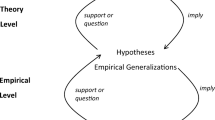Abstract
In this paper, I argue (i) that there are certain methodological practices that are epistemically significant, and (ii) that we can test for the success of these practices empirically by examining case-studies in the history of science. Analysing a particular episode from the history of medicine, I explain how this can help us resolve specific cases of underdetermination. I conclude that, while the anti-realist is (more or less legitimately) able to construct underdetermination scenarios on a case-by-case basis, he will have to abandon the strategy of using algorithms to do so, thus losing the much needed guarantee that there will always be rival cases of the required kind.
Similar content being viewed by others
References
Churchland P. (1985) The ontological status of observables: In praise of superempirical virtues. In: Hooker C. (ed.) Images of science. University of Chicago Press, Chicago, pp 35–47
Glymour C. (1985) Explanation and realism. In: Churchland P., Hooker C. (eds) Images of science. University of Chicago Press, Chicago, pp 99–117
Kelly K. (2007a) A new solution to the puzzle of simplicity. Philosophy of Science 74: 561–573
Kelly K. (2007b) How simplicity helps you find the truth without pointing at it. In: Friend M., Goethe N., Harizanov V. (eds) Induction, algorithmic learning theory, and philosophy series: Logic, epistemology, and the unity of science (Vol. 9). Springer, Dordrecht, pp 111–143
Kitcher P. (2001) Science, truth, and democracy. Oxford University Press, New York
Kukla, A. (1996). Does every theory have empirically equivalent rivals? Erkenntnis 44(2), 137–166.
Kukla A. (1998) Studies in scientific realism. Oxford University Press, New York
Lipton, P. (1994/2004). Inference to the best explanation, second revised edn. London: Routledge.
Mill, J. S. (1843/1950). Philosophy of scientific method. New York: Hafner Publishing Co.
Psillos S. (1999) Scientific realism: How science tracks truth. Routledge, London
Snow J. (1849a) On the mode of communication of cholera. J. Churchill, London
Snow J. (1849b). November 2; November 30). On the pathology and mode of communication of cholera. London Medical Gazette, 44, pp. 745–752; 929–932.
Snow, J. (1851, November 29; December 13). On the mode of propagation of cholera. Medical Times 3, pp. 559–562; 610–612.
Snow J. (1855) On the mode of communication of cholera. second much enlarged edn. J. Churchill, London
Stanford’s P. K. (2006) Exceeding our grasp: Science, history, and the problem of unconceived alternatives. Oxford University Press, New York
van Fraassen B. (1980) The scientific image. Clarendon Press, Oxford
Vinten-Johansen, P., Brody, H., Paneth, N., Rachman, S., & Rip, M. (2003). Cholera, chloroform, and the science of medicine: A life of John Snow. Oxford: Oxford University Press.
Author information
Authors and Affiliations
Corresponding author
Rights and permissions
About this article
Cite this article
Tulodziecki, D. Underdetermination, methodological practices, and realism. Synthese 190, 3731–3750 (2013). https://doi.org/10.1007/s11229-012-0221-9
Received:
Accepted:
Published:
Issue Date:
DOI: https://doi.org/10.1007/s11229-012-0221-9




